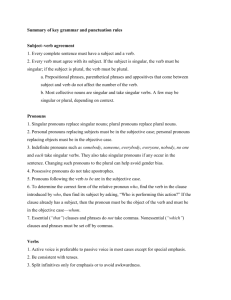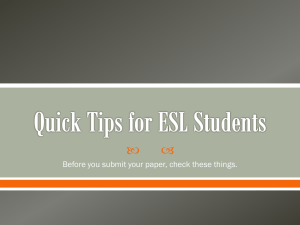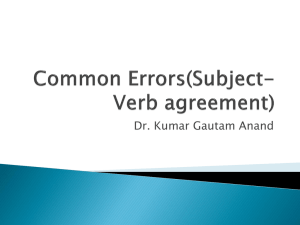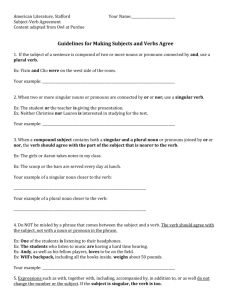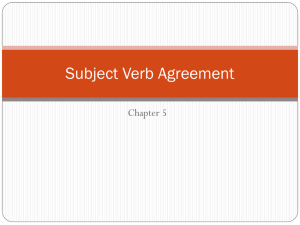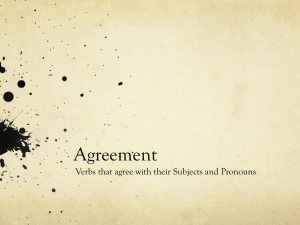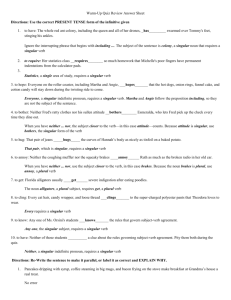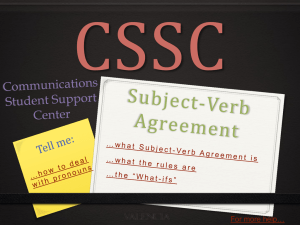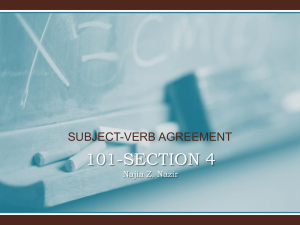subject-verb-agreement-powerpoint
advertisement
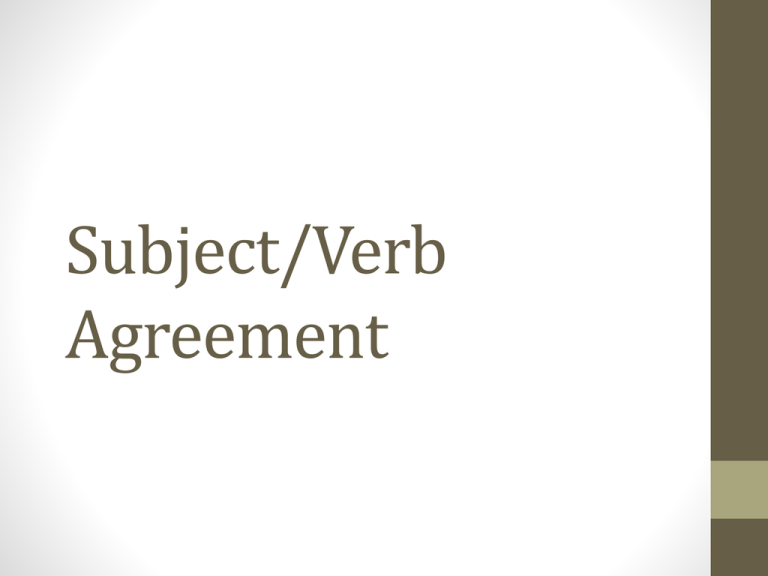
Subject/Verb Agreement The Basics • First identify the subject of the sentence and determine if it is singular or plural • She likes apples. • She=subject • She is a singular subject • Singular subject + singular verb • She likes apples. • Plural subject + plural verb • Susan and Bill like apples. Indefinite Pronouns • Indefinite pronouns refer to an unknown or unidentified person, place, or object • Common indefinite pronouns: each, every, neither, any, anyone, no one, someone, somebody • Indefinite pronouns usually use a singular verb • Somebody needs to clean up this mess. Exceptions • The following indefinite pronouns use plural verbs: both, few, many, several • • • • Both of them need new computers. Few understand the new material. Many people love to watch football. Several of the books are overdue. More Exceptions • The following indefinite pronouns use either singular or plural verbs: all, most, none, some • • • • All of the food is gone. All of the groups are registered. None of the people need money. Some of the test appears difficult. Parenthetical Phrases • A phrase that provides a digression from the rest of the sentence. • If removed, it does not make the sentence incomplete. • Catherine, along with Monica, likes art museums. • Singular subject=singular verb • Do not be confused by words between subjects and verbs. • The vase of flowers looks beautiful on the table. Expletives • Expletives: here, there • Expletives are not subjects. Be careful to identify the subject of the sentence, not the expletive. • Here is the cell phone. • Cell phone is the singular subject, so the verb is singular. • There are plates in the dishwasher. • Plates is the plural subject, so the verb is plural. Collective Nouns • Words that refer to more than one person but are singular subjects: family, group, class • These nouns require singular verbs. • My family wants a new car. • Their group plans to split up the work for the project. • Her class knows how to write a good paper. Subjects joined by “and” • When “and” joins two subjects together, that sentence requires a plural verb. • Samantha and Robert like to eat ice cream. • The bookmark and the reading light are on the table. • Her clothes and shoes need to be washed. Use of: or, either, neither/nor • Subjects joined using “or,” “either,” “neither,” and “nor” use singular verbs • Sam or Brian listens to the radio. • If the subjects are plural, the sentence uses a plural verb • Neither the boxes nor the crates are heavy. • The subject closest to the verb determines if the verb is singular or plural. • Either the students or the teachers eat lunch at noon. Practice • Choose the correct form of the verb: • Tara takes/take a shower after practice. • Mike and Dylan likes/like to watch football together. • Either he or she puts/put the papers there. • Her family travels/travel to Paris every summer. • Someone in my classes never comes/come to the study sessions. More Practice • One of my friends eats/eat a sandwich every day. • There is/are two cars in the driveway. • Neither Kim nor Tom ever cheats/cheat. • Few realizes/realize how difficult it is to write a poem. • Each person receives/receive a different grade. • Candice along with her friends enjoys/enjoy watching the news.


